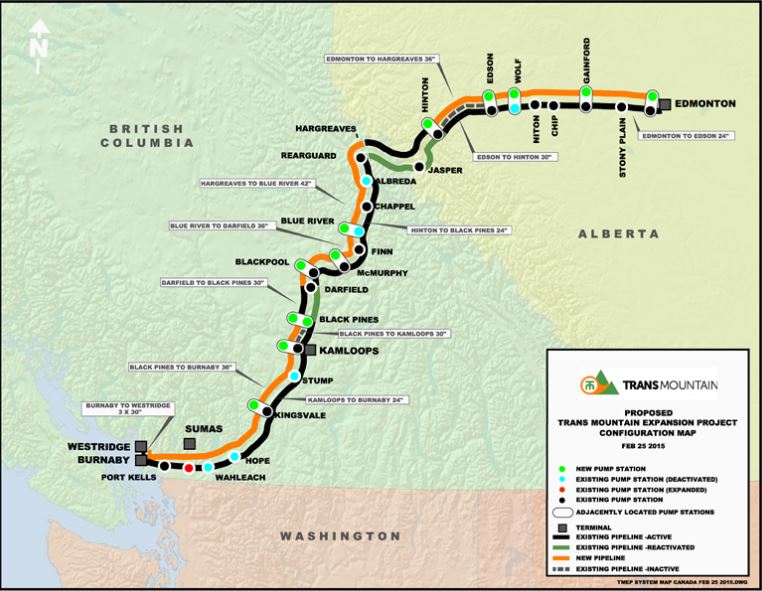Trans Mountain pipeline cost rises to $12.6 billion

Proposed Trans Mountain twinned pipeline expansion project.
The expected cost of the Trans Mountain pipeline expansion has jumped to $12.6 billion from the previous estimate of $7.4 billion.
The new estimate, which includes the $1.1 billion already spent by the previous owner Kinder Morgan Canada, has been approved by Trans Mountain Corp., the entity that operates the pipeline on behalf of the Government of Canada. It said the money is needed to bring the expansion into service by 2022.
Published reports say the increased cost is due in part to the August 2018 Federal Court of Appeal decision that struck down Ottawa’s initial approval of the project. As a result of the ruling, the government had to make a number of accommodations to Indigenous communities along the route, as well as meet environmental standards. Those changes added roughly $3 billion to the construction price tag, according to a report by the CBC.
In a ruling announced on February 3, 2019, The Federal Court of Appeal dismissed an appeal by Indigenous groups that challenged Ottawa’s approval of the Trans Mountain expansion.
The Canadian government became an owner of the Trans Mountain pipeline in May, 2018, following a $4.5 billion purchase agreement with former owner Kinder Morgan Canada.
The original Trans Mountain Pipeline was built in 1953 and continues to operate today. The proposed expansion is essentially a twinning of the existing 1,150-km pipeline between Edmonton, Alberta and Burnaby, British Columbia.
“Today, we have more than 2,900 people working on the project and that number will grow significantly in the months ahead,” Trans Mountain Corp. said in a press release Friday February 7.
The project is expected to drive significant economic benefits for workers, businesses and Indigenous communities across Alberta, British Columbia and Canada as a whole. At peak construction, there will be approximately 5,500 workers employed in communities along the construction corridor in Alberta and British Columbia.
Canadians are expected to benefit from economic and tax contributions made by the project once it is up and running. In addition, Trans Mountain will make payments to the British Columbia government of between $25 million and $50 million annually. The total contribution over a 20-year period is expected to be up to $1 billion.
Prime Minister Justin Trudeau continues to face huge pressure from Alberta and its Premier Jason Kenney to get the Trans Mountain pipeline built so that Alberta’s resource sector can move more of its oil offshore to markets in Asia.
To date, Trans Mountain Corp. has spent $2.5 billion on the project, a figure which includes the impact of delays and the resulting additional regulatory process. It is expected that an additional $8.4 billion will be spent to complete the project, plus $1.7 billion of financial carrying costs.
Trans Mountain is recommending that the Government of Canada place another $600 million in reserve for cost impacts beyond the control of Trans Mountain.
